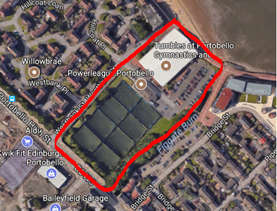Westbank Pitz
/Portobello Community Council used a participation request as part of the community's wider effort to increase their involvement in the sale of the Westbank Street land, known locally as the ‘Pitz’.
Background
In 2015, City of Edinburgh Council proposed and approved the sale of the Westbank Street land, known locally as the ‘Pitz’ site. The site was being leased by the 5-a-side football operator, Powerleague as well as Tumbles Gymnastics and Softplay Centre. The council’s plan was to use some of the proceeds to help fund the redevelopment of sports facilities at Meadowbank. Some of the proceeds would also go to Powerleague.
There was widespread local concern that local leisure facilities and open space were to be lost without adequate consultation with the community. Portobello Community Council wanted therefore to increase the involvement of the community council and wider community in the potential sale of the site.
Making the request
On 25 April 2017, Portobello Community Council submitted a participation request to City of Edinburgh Council to increase participation of the community in the process going forward and their influence on the scope and nature of any development of the land.
“It was a very simple process: I searched City of Edinburgh Council website and found a request form, filled it in and e-mailed it. Portobello Community Council decided to submit a request at our Monday meeting, and I’d submitted the request by Tuesday afternoon. Sean Watters, Then Secretary of Portobello Community Council
The decision
City of Edinburgh Council agreed to the request, and an outcome improvement process was developed involving both groups.
The process
The process was to consist of a community survey and focus groups, designed collaboratively with the community council. The community council would also be involved in the evaluation of new bids for the site, before the council gave final approval.
In accordance with the outcome improvement process and timeline, City of Edinburgh Council undertook a survey and a series of focus group meetings. The survey was based around the parameters of the land sale and the “development brief”.
Subsequently, Portobello Community Council ran their own survey, addressing issues of community interest not covered by the city council’s survey. It was completed by 570 people and showed support for taking an alternative community-led place-making approach to deciding how the site should be used. Responses to the survey also indicated a strong prioritisation for open spaces and sport and recreation facilities over housing, commercial and business.
The community council’s survey was used by a new group set up to spearhead the campaign against the sale as originally proposed. This group, Action Westbank was a subgroup of another active group, Action Porty, which has good links with Portobello Community Council
Action Westbank was funded by the Scottish Government (Making Places) to conduct a community-led design process across one weekend in March 2018.
The place-making event led to the creation of three ‘mixed use’ scenarios that indicating a range of levels of development. Action Westbank and local councillors then used the scenarios created by the community-led design process to show council officers and other elected members that seeking to ignore community concerns in advance of the sale of the site was not the best way forward.
Outcome
In Oct 2018, City of Edinburgh Council Finance and Resources Committee decided to withdraw the site from open market and, in line with what Action Westbank were calling for, to “work with the local community to establish a master plan that seeks to deliver a balance between financial return and local community place-making aspirations”
The original tenant, Powerleague eventually decided to further develop the site as a sports facility, which is broadly supported by the community.
Learning
The community council describes its experience of the process as “mixed”. Making the initial participation request was simple and the response from the council encouraging. Less positively, the community council felt side-lined by the council during the process, which led to them conducting their own separate survey.
“Overall the participation request was useful in that it opened up the issue to renewed scrutiny and public input, but the exercise could’ve been far more productive if council officers in the Consultation Team had engaged with the community council properly, instead of dismissing our input and experience of routinely and regularly consulting with the community. “ Sean Watters
Links to more information
For more case studies and other resources on participation requests visit www.scdc.org.uk/what/participationrequests


